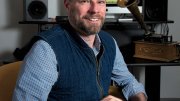The son of a dentist and a psychologist, Peabody professor of music Alexander Rehding thought he’d end up in the medical field. After finishing high school in Germany, he worked in a home-care center—a way to serve his country in lieu of required military service—and realized that field was not for him. Eager to study abroad, he applied to the University of Cambridge. Russian was his favorite subject, but he figured studying it in England would be strange. “And so, I thought, ‘Music isn’t bad!’” He was a trombonist and pianist, but didn’t know much about Cambridge’s world-renowned music program. “I was incredibly naïve.” To his surprise, he got in. The first three years presented a rigorous and narrow view of music theory, but when he returned for a master’s, everything opened up. “It was sort of this flood of new stuff that I was confronted with that I had no idea existed,” he recalls. Moving to the United States after a decade in England continued the flood of ideas, including the concept of American football. He met his neuroscientist husband at a Super Bowl party in 2004 after taking a position at Harvard. (They have two kids now, but still know nothing about football.) Though some would consider his work highly interdisciplinary, Rehding prefers to view music as a broad field, and says he’ll never be a specialist. He’s produced scholarship on ancient Greek and Egyptian music, Beethoven’s Ninth Symphony, and modern sirens. “I have a very short attention span,” he explains. “I get bored very easily.” He lets an interest percolate in the background until he feels compelled to write about it. “I’m super excited about whale song at the moment,” he says. “I don’t know where that’s going to take me.”
Alexander Rehding in brief
Alexander Rehding in brief
The Peabody professor of music, in brief

Alexander Rehding
Photograph by Stu Rosner
You might also like
Harvard’s Hasty Pudding Honors Rose Byrne
The Bridesmaids actress celebrated her 2026 Woman of the Year Award with a roast and a parade.
How a Harvard and Lesley Group Broke Choir Singing Wide Open
Cambridge Common Voices draws on principles of universal design.
Rabbi, Drag Queen, Film Star
Sabbath Queen, a new documentary, follows one man’s quest to make Judaism more expansive.
Most popular
Explore More From Current Issue

At Harvard’s Beck-Warren House, Ghosts Speak Many Languages
The quirky 1833 home now hosts Celtic scholars.

How Stories Help Us Cope with Climate Change
The growing genre of climate fiction offers a way to process reality—and our anxieties.






